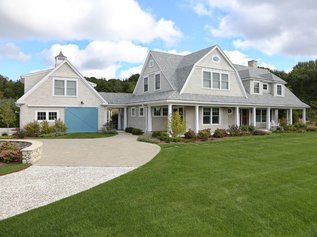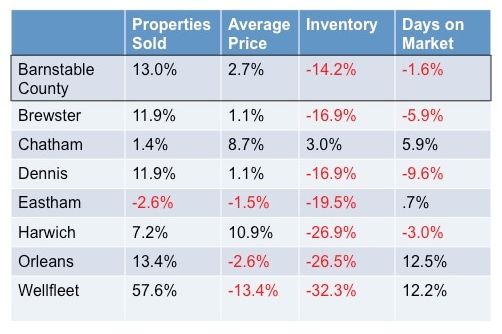Cape home owners and property managers have been waiting with baited breath as a proposed occupancy tax made it’s way through the state capitol for the past decade. Recent news suggests that the new occupancy tax targets only those properties that have short term rentals for 150 days or more of a calendar year. Most Cape properties rent for fewer than 150 days. The Cape’s prime season is usually 60-65 days, and with June and September added, the total day increases to about 120. Occupancy in June and September tends to average between 35-35% so this new tax will not affect the economics of most vacation rental properties. The details of the bill are forthcoming and we will pass those along when available. Good news to be sure.
Monthly Archives: January 2017
2016 Construction Review
Construction and renovation activity on the Cape has been strong again in 2016. Compared to 2015 there has been an 8.2% increase in the number of building permits issued in Barnstable County. By contrast, the value of those permits actually decreased by about 7%. The decrease in the value of the permits is due to less new construction and more remodeling permits being issued. Still, 2016 ranks in the top three in permit value and permits issued in the past 10 years. *

On the Lower Cape, we have seen this busy trend continue as well. Chatham continues to be one of the most active with regards to construction and renovation. As mentioned in the sales market review, since there is historically low inventory, we are seeing buyers pay a hefty premium in many cases for a newly renovated or constructed home.
Beyond the numbers, we have had some valuable experience in 2016 with allowable uses of properties on or close to conservation resources, most notably water or wetlands. Many potential or current property owners assume that conservation by-laws are written in stone. When in actuality, there is room to work with town officials to accomplish a goal or most of a goal. Of course it takes more time and money to go through the process, but in most cases, not a prohibitive amount of either. And if planned properly, the project can significantly increase the value of a property for enjoyment and market value.
Over the past year, we have been fortunate to work with many current and potential buyers to find solutions to problems that the general market overlooks. Having a team with expertise in construction, zoning and conservation can help create a unique property that may not exist on the current low-inventory sales market.
*Source: Home Builders and Remodelers Association of Cape Cod
2016 Cape Cod Real Estate Review
2016 was a very interesting year for the Cape Cod region with historically low inventory of available homes leading the headlines. The 14% year over year decrease in actively marketed homes on the Cape and Islands MLS resulted in 2016 ending with the lowest recorded inventory level since that statistic had been tracked. This is an astounding 48% drop from the 10 year high. Interestingly, despite this clear lack of supply, pricing has only posted a modest gain (2.7% over 2015) while sales volume showed a more impressive jump (up 13%). The takeaway: the lower end of the market (<$500,000) has been most active. By contrast, we have seen record setting purchases in many towns:
Brewster: $3,450,000 96 Winterhoff Trail
Chatham: $10,800,000 132 Shore Rd
Dennis: $3,050,000 9 Mark Rd
Harwich: $8,150,000 6-10 Neel Rd
Orleans: $7,000,000 47 Nauset Rd

Looking forward, it seems inevitable that interest rate increases will continue at a modest clip. These increases will be tempered by expanded lending products and increased loan-to-value ratios so we do not anticipate the increasing rate environment to significantly impact price appreciation.
Anecdotal feedback from existing customers/clients suggest there are two distinct groups of prospective buyers in the current market: those looking for a “deal” or those looking for something that is new or newly renovated to call their own. The deal seekers hunt for near term equity opportunities and are willing to deploy minor improvement efforts to achieve their goal. Inventory, or lack thereof, has been particularly frustrating to these buyers as sellers simply are not overly motivated to provide the value they seek. By comparison, turn-key buyers are willing to stretch to have the home in move-in condition and, in some cases, overlook the near-term asset value for convenience. This prioritization of one’s personal enjoyment over the asset value has been the primary driver of the region’s speculative development business at all price points.
Looking into the crystal ball, we anticipate a solid improvement in pricing in 2017. The relative affordability of financing, demographic patterns and scarcity of inventory should lead to positive appreciation gains in 2017 for Cape Cod Real Estate.
